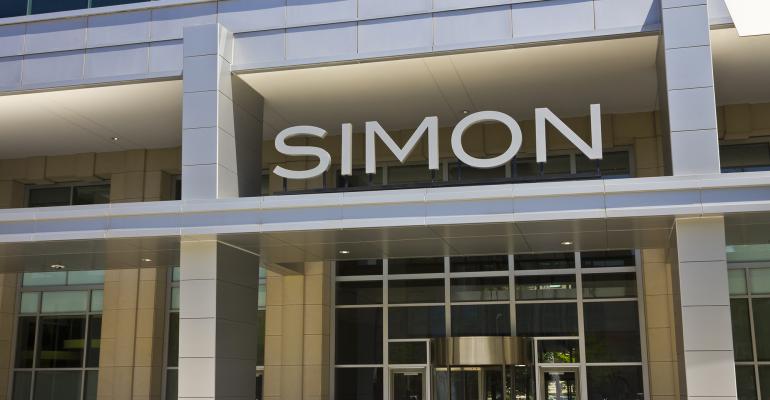Retail REIT Simon Property Group, the country’s largest operator of regional malls, is riding the SPAC wave. We don’t know yet where that wave will take the company, but industry insiders offer a number of guesses.
On Jan. 29, Indianapolis-based Simon filed paperwork with the U.S. Securities and Exchange Commission (SEC) to form a special purpose acquisition company, or SPAC. The SPAC, called Simon Property Group Acquisition Holdings Inc., seeks to raise at least $300 million through an IPO.
A “blank check” SPAC is a shell company with no operations that’s set up for the sole purpose of raising cash via an IPO and eventually acquiring an existing company. It’s considered a less costly, less complicated fundraising alternative to a traditional IPO.
David Simon, chairman of Simon Property Group, also serves as chairman of the SPAC. Eli Simon, senior vice president of corporate investments at the family-run company, is the SPAC’s CEO. Eli is David’s 33-year-old son. Simon Property Group will own about 20 percent of the new company once it goes public.
It’ll be up to the Simons, along with folks like Stanley Shashoua, vice president of the SPAC and chief investment officer of Simon Property Group, to choose an acquisition target. As with other SPACs, the Simon SPAC has left the acquisition door wide open. In its SEC filing, the SPAC identifies these sectors for a potential acquisition:
- Health and wellness
- Food and beverage
- Distribution
- Restaurants
- Education
- Sustainability
- Co-working
- Entertainment, gaming, sports and e-sports
- Hospitality
- E-commerce
- Direct-to-consumer retail
- Traditional retail
- Retail licensing
Simon Property Group did not respond to a request for comment.
Choosing a direction
Barrett Cohn is co-founder and CEO of Scenic Advisement, a San Francisco-based investment bank that, among other things, advises private companies on their IPO strategies. He believes Simon’s SPAC will purchase an e-commerce company that would complement the landlord’s retail properties.
“There’s no way they’re not doing something online. There’s no way that what they’re going to do with this SPAC is not something that’s going to be highly accretive to their own portfolio, but also [have] stand-alone value,” Cohn says.
Simon SPAC will likely exercise its “experience and heft” to snap up a logistics technology company, predicts Zach Aarons, co-founder and general partner of New York City-based venture capital firm MetaProp. The recent surge in e-commerce has buoyed the logistics sector.
Another theory—this one from Shane Neman, a commercial real estate investor and developer in South Florida who runs his own family office—is that the Simon SPAC will scoop up an operator of failing malls in secondary and tertiary markets and either beef up their tenant rosters or repurpose the space.
No matter which path the Simon SPAC picks, commercial real estate broker Jaime Sturgis, CEO of Fort Lauderdale, Fla.-based Native Realty, says this move enables the REIT to diversify at a time when malls are struggling. Cohn says that if he were plowing capital into the stock market right now, he’d feel comfortable betting on the Simon SPAC.
“Simon is a really entrepreneurial company in the commercial real estate space, and they’re a thoughtfully diversified company,” he says. “I’m not surprised that they’re going to do this SPAC, when it’s easy to do and everybody’s doing it. But I think what they will do with it will be more interesting than many of the other players in the retail space, because they are so innovative.”
A prime example of that entrepreneurial bent: Simon recently helped rescue five retail brands (and five Simon tenants)—Aéropostale, Brooks Brothers, Forever 21, J.C. Penney and Lucky Brand.
SPAC explosion
The rapidly growing SPAC universe is filled with both strong and weak contenders, Cohn notes. The 248 SPAC IPOs listed last year on U.S. stock exchanges raised $83 billion—record-setting for both the number of SPAC IPOs and the amount of SPAC proceeds. Cohn and many other market observers anticipate an eventual fallout in the SPAC market as some acquisitions fail to meet expectations.
While SPAC IPOs are “very favorable” for sponsors and private equity investors are eager to deploy dry powder, SPAC IPOs are more opaque than traditional IPOs and deliver “unproven benefits” to investors, says Peter Lewis, chairman and president of New York City-based investment firm Wharton Equity Partners
“Once the world gets back to normal and retail investors—who are buying many of the SPAC shares—are not sitting at home looking at their computers, I believe the activity in SPACs will slow down,” Lewis says. “Also, as results of performance start to trickle in over time, investors will come to realize that a lot of SPACs never live up to the hype.”
Despite the hyped-up SPAC atmosphere, experts foresee other commercial real estate companies following the lead of Simon, CBRE and Tishman Speyer in launching SPACs. Potential acquisition targets for commercial real estate SPACs include companies operating in the distribution, industrial, vacation resort, mortgage financing, seniors housing and property technology niches, according to Evan Hudson, a real estate partner at New York City-based law firm Stroock & Stroock & Lavan.
Sturgis says SPACs are attractive to commercial real estate investors because they can raise capital first and then find a company to acquire, as opposed to the other way around with a traditional IPO.
“As long as retail investors and institutional investors perceive opportunity to generate above-average returns by buying shares of SPACs, Wall Street will continue to feed the beast,” Lewis says.
Corporate attorney Milton Vescovacci, a shareholder in the Miami office of the Gunster law firm, agrees with that assessment.
“Due to the prevalence and popularity of SPACs, I think we will see more of them. SPACs are aggressive competitors to private equity fund buyers, who themselves are exploring SPACs aside from their traditional funds,” Vescovacci says. “Also, operators of successful businesses who are interested in testing the waters—while using other people’s money—will likely want to form their own SPACs, relying purely on their reputations as successful business operators.”





